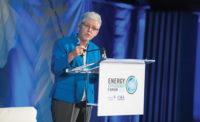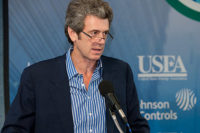
Seventy-nine percent of respondents to the survey stated that energy efficiency is important to their customers. Only 21 percent said it is not important. Of those who answered in the affirmative, some were very emphatic in their responses.
Fred of Rumba Air, Brooklyn, N.Y., noted that the "major issue today in the industry is consumption of energy. We are day by day trying to find and give the customer the best in energy savings for their money."
Korey Knobloch of Help Air Conditioning & Heating, Harahan, La., commented, "All my customers are making the switch to high-efficiency systems. We really don't even offer the 10-SEER systems and haven't for some time. Customers see their energy bills going higher and higher, and with the education we provide them, they make their own choice on which unit fits their needs. Here in New Orleans an air conditioner can account for as much as 60 percent of their energy bill."
Brad Williams of Palmer-Donavin, Columbus, Ohio, replied, "When homeowners make a (usually) once-in-a-lifetime furnace purchase, they are very interested in efficiency and economics. Some homeowners want the best and most efficient system. Most, however, will buy the system that balances efficiency with first cost."
Utility Bill Impact Grabs Attention
Matt Brock of Roe Heating and Refrigeration, Washington, Iowa, responded, "I have upsold many gas furnace estimate requests to a closed sale on a heat pump system. I have also sold many biomass heating systems since we became the first dealer in the area to offer the technology. If you mention energy efficiency and how it impacts [the customer's] monthly expenses, it grabs their attention in a hurry. My favorite line is ‘You know you are already paying for a new system.' That usually sparks their interest and they are more willing to further listen to my comments."To get customers to consider a more efficient system, "education is the only way," added Brock. "Your sales staff as well as your service techs need to stay up-to-date on energy prices and trends. They need to understand efficiency and how to directly soften the impact of high energy rates on their customers."
Karl Brugger of Climate Care, Leawood, Kan., stated his customers are "insulating their homes and buying higher efficiency equipment than what they have. I install normally only 92-percent furnaces and 12-SEER A/C. I would sell even higher efficiency when the investment/return would be better above SEER 13."
A more blunt and succinct response came from William Swieczwski of Peak Mechanical in Alaska. When it comes to efficiency, customers are "listening to what I am saying the first time."
Respondents noted a variety of measures that customers are taking to improve efficiency. Michael Taylor of Pioneer Comfort Systems, Shreveport, La., said that his customers are "purchasing maintenance agreements, ensuring the technicians are cleaning the equipment, asking how they can conserve/save energy dollars, asking about or listening to system design. They seem genuinely interested in getting the job done the best way possible."
Lynette Gefroh of Prairie Heating & Air, Linton, N.D., related that customers are "changing air filters more often" and purchasing "setback thermostats." Chris Mamola of Mola Bea Air, La Quinta, Calif., cited "checking ductwork."
On the commercial side, Don Langston of Aire Rite, Huntington Beach, Calif., said customers are utilizing programmable thermostats, economizers, and air balancing of the building.
A Hard Sell In Some Regions
As for those who said energy efficiency is not important to their customers, several contractors provided detailed responses on why it is not attractive in their area.Michael Slade of Donelson Air Conditioning/AC Service & Installation, Nashville, Tenn., replied, "It's difficult in our particular geographical area to get customers very excited about higher efficiency systems. Our climate is such that we don't have much of a winter or a summer most years. Granted, it does get cold in winter, and it does get hot in summer, but the duration of either is typically relatively short.
"Trying to interest a customer in higher efficiency and long-term savings is a hard sell when they are aware that they may not recoup that extra money spent for higher efficiency equipment within a reasonable period of time, therefore not being able to tangibly justify the extra expense. As a former field residential service tech, I tried to make customers aware that a higher efficiency system could definitely save them money, but I didn't always have the numbers to back me up.
"I feel that higher efficiency solutions are more feasible to the customer in areas where the seasons are harsher."
According to Eric Robinson of GB Systems Inc., Kenmore, Wash., the cost of higher efficiency equipment would have to come down. "With the economy here in the Northwest, operating budgets have gone down and overall spending on HVAC has dropped a lot. Many long-time customers have even dropped preventive maintenance contracts and have gone to T&M (time and materials) for service.
"It would take financial assistance from the local utilities to offset the project amount in order to sell the higher priced equipment."
Finally, Robert Escamilla of Arctic Pole Heating & Air Conditioning, San Antonio, stated, "The economy would have to change to where people would have more capital to spend. People on the average just want cooling.
"‘Just get me cool' is the attitude, for the least cost. You don't hear people conversing about how great their A/C is. ... SEER is something they hear of and they want it, but do not want to pay for it as long as they can stay cool."
Publication date: 11/08/2004



